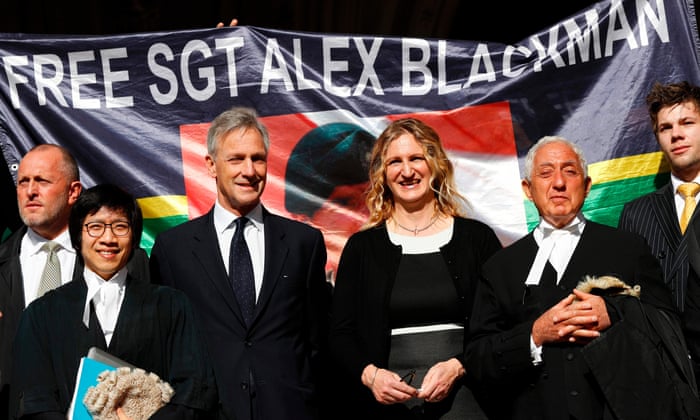"Former marine cleared of murder 'should be freed immediately'": The Guardian
https://www.theguardian.com/uk-news/2017/mar/16/former-marine-cleared-alexander-blackman-freed-immediately-ex-soldier-jail
https://www.theguardian.com/uk-news/2017/mar/16/former-marine-cleared-alexander-blackman-freed-immediately-ex-soldier-jail#img-1
Comment:
The focus of army training, both psychological and physical, is to kill other humans without compunction. It is an inherent and essential skill set.
Parallel to it is the dehumanising of the enemy and the two come together whenever hostilities break out.
At a superficial level it is easier on the conscience to kill at a distance but even close up, the training and propaganda may be sufficient to quell any ethical reservations.
However it is clear from social indicators such as PTSD, depression, alcoholism, homelessness, crime and suicide, that longer term the consequences of guilt may be harder to suppress.
In Blackman's case, and we should not dwell on the obvious irony in a name, not only was he aware of what he was doing and its illegality, for he specified it to his platoon, but he must have known he was being recorded.
It certainly demonstrates a certain degree of nonchalance to killing generally, and his victim in particular, especially as he offered up no resistance or threat. We should note that in order to plead guilty to a lesser charge of manslaughter, he had to significantly change his story and admit that he knew the man was alive when he shot him.
We should not underestimate the mind numbing effect of battle, the power of revenge, or the ease with which a trigger may be pulled. We are deceiving ourselves, if we think we can send men to war as we might teachers to the playground but equally shooting even an enemy in cold blood, cannot be condoned or pardoned. Soldiers know the rules and break them at their peril.
Blackman's action was just one tawdry event in a much bigger one, of which we ALL stand accused, and it does none of us any good to try to excuse either one.
See also the parallel case of Sgt. Elor Azaria in Israel.
http://images.deccanchronicle.com/dc-Cover-bsnudco08r3igtj44duecnr7m4-20170104171150.Medi.jpeg
"The former Israel Defence Forces (IDF) medic claimed he killed 21-year-old Abdel Fattah al-Sharif because he remained a threat, but judges found Azaria was exacting vengeance and stated that “he deserved to die” after pulling the trigger. The killing was caught on video by a Palestinian human rights activist who heard gunshots outside his home in the West Bank city of Hebron on 24 March 2016."
http://www.independent.co.uk/news/world/middle-east/hebron-shooting-video-idf-elor-azaria-convicted-manslaughter-israeli-soldier-abdel-fattah-al-sharif-a7520026.html
From the above Independent article, the shameful position of Netanyahu and others is clear:
"Mr Netanyahu, ministers and prominent right-wing politicians have called for the soldier to be pardoned – a position supported by 67 per cent of respondents in an Israeli television poll.Mr Netanyahu and right-wing politicians have not echoed their condemnation. Education minister Naftali Bennett, leader of the right-wing Jewish Home party, said Azaria killed a “terrorist who deserved to die” after attacking a soldier."
In essence the two cases illustrate very similar phenomena. The ease with which heavily armed soldiers, illegally occupying a foreign territory, can bring death to what are interpreted as opponents, even when incapacitated and offering no resistance.
The explanation must lie in the psychological conditioning to which they have been subject, eliciting feelings of hatred and revenge, even where these are not justified, and overcoming the natural reticence to kill. This is a very sad state of affairs and reflects as badly on the wider organisation and country as it does on the individual. We are it seems sinking ever further into a moral abyss.
The second common feature is the way in which the wider community has reacted to the legal process which has attempted to hold individuals to account for their actions.
Although the public holds out little sympathy for murders, and if we can believe opinion poles, would reintroduce the death penalty, they ironically take the opposite view regarding murder by soldiers (and to a lesser degree policemen)
This is a paradox worthy of explanation presumably embedded in primitive tribalism and kinship. It might also be influenced by the belief that an individual placed in such onerous situations, effectively protecting the wider community or pursuing government policy, should not be held to the same standards of restraint and ethical behaviour that would apply to the rest of us.
Despite calling for the severest punishment for murderers, murderers that happen to be soldiers and policemen evoke sympathy rather than the desire for retribution.
In both of these specific cases it is clear that the people defending the accused, have had little regard for the principle of the sanctity of life or empathy for the victim or their extended family.
We are faced by the conclusion that violent actions are never viewed objectively but are nuanced in the public mind by who does it to whom and in what circumstances. If accepted and generally applied, it encourages the belief that any brutality and inhuman treatment will be justified and protected as long as the individual is in uniform and ostensibly acting on behalf of the state.
That is a recipe for disaster and we all know where it leads. All the other signs are, we are inescapably going in that direction. Certain elements of government aligned to the Israeli state, appear to be steering us in that direction.
No comments:
Post a Comment
Note: only a member of this blog may post a comment.